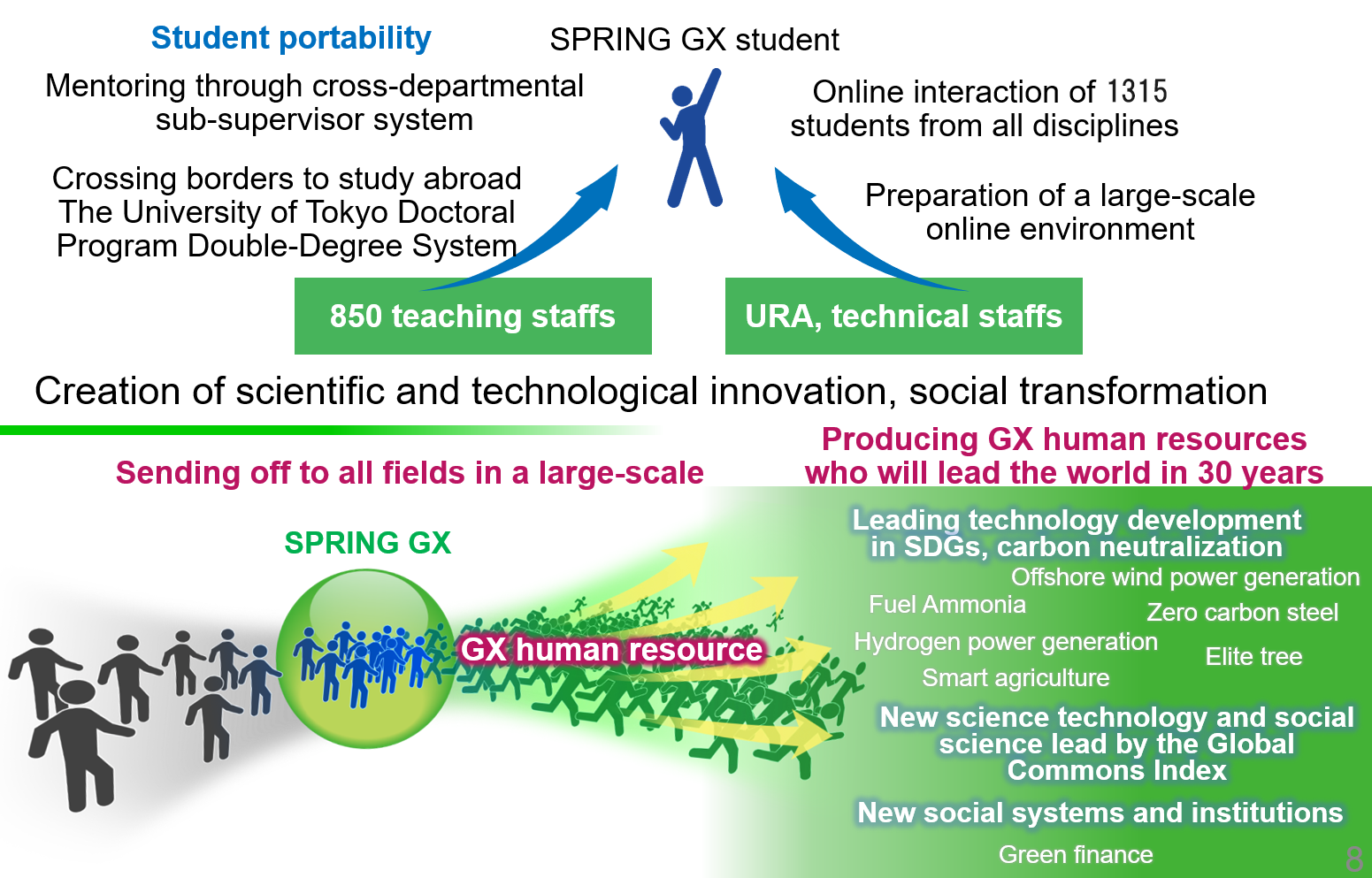Overview of the project
The "Fostering Advanced Human Resources to Lead Green Transformation (GX)" project proposed by Professor Shin-ichi Ohkoshi (Project officer) has been accepted as a program for Support for Pioneering Research Initiated by Next Generation (SPRING) of Japan Science and Technology Agency (JST) from autumn, 2021. Hereinafter this project is referred to as "SPRING GX". 1315 doctoral students from all schools of the University of Tokyo participate in this project.
(1) Purpose and contents of the doctoral program student support project
The project (SPRING GX) aims to produce globally competent researchers who will contribute to realizing a Green Transformation (GX)* in all fields on a large scale (1315 people enrolled in a doctoral program). The University of Tokyo will invest all existing assets to (1) create an environment where students with deep expertise and high-level research ability can freely conduct challenging and emergent research to feed their curiosity, (2) foster an ‘awakened culture where GX encompasses of the future vision of society and each student’s own research is related to societal issues, and (3) develop transferable skills to fully demonstrate professional abilities in society. For this purpose, three core programs and advanced skill training programs will be developed to realize a high portability of the student support environment. The project manager will select students with the assistance of the steering committee based on the students’ will to position their own research in GX, expertise, and the potential of the doctoral research. To ensure transparency, experts from national research institutes and industrial companies will also be engaged in the student selection process.
(2) Career development and training contents
Core programs and advanced skill training programs will be provided. The former consists of three programs: a bird’s-eye view lecture series on GX, a green future exchange meeting where students develop the relationship between their own research and GX through exchanges between students across disciplines, and GX-inspired lectures to highlight the relationship between cutting-edge research in various fields and GX. Through these core programs, individual students will embed the GX seeds in their own consciousness. The advanced skill training program consists of overseas training, industry–academia collaboration, and transferable skill acquisition support. Furthermore, educational contents will be developed based on cross-disciplinary programs, which have accumulated achievements at the University of Tokyo World-leading Innovative Graduate Study (WINGS) programs. 1315 participating students will be provided a variety of programs tailored to their individual specialties and circumstances, and students will acquire the ability to fully demonstrate their professional abilities as GX experts in any field. At the same time, a supportive environment will be created for doctoral students to freely carry out challenging and integrated emergent research.
(3) Project officer

Shin-ichi Ohkoshi
SO, the Project officer, has made remarkable global achievements in the field of fundamental science (chemistry). SO discovered long-term heat storage ceramics (λ-Ti3O5) and high-performance ferrite magnets (ε-Fe2O3) comprised of common elements. These materials contribute to solving energy problems and the Internet of Things (IoT) society. In addition to being reported in The Economist (UK), ε-Fe2O3 was also on display at the Science Museum, London (UK). The developed materials are attracting attention from industry, and some fields have already realized practical applications of SO’s research. After working for the 21st Century COE Program, the University of Tokyo GCOE program, and program for Leading Graduate Schools, SO is currently in charge of the University of Tokyo’s highly valued Global Science Graduate Course (GSGC). As a cross-organizational effort, he advocated for and implemented The University of Tokyo’s first doctoral double degree (UTokyo Double Degree) program. Currently, he is the director of a large-scale joint research project of the Center National de la Recherche Scientifique (France), has collaborated with foreign universities in 13 countries, and published more than 100 co-authored papers.
Details of the qualifications and capabilities of the Project officer
Consistency with UTokyo’s philosophy and policies, characteristics, uniqueness, and strategy
To solve the global challenges, we must confront and solve a wide variety of problems across all fields!

The project is consistent with the University's philosophy; (i) better management of the Earth’s system (global commons) as a common property of humankind, (ii) contributing to the realization of carbon neutrality, (iii) promoting digital transformation, (iv) diversity research, etc. The uniqueness of this project lies in the fact that GX is not only limited to green innovation but is a complete social transformation. Therefore, the subjected fields are those related to human activities, i.e., all fields. For the results to benefit society, it is important strategically to promote the project on a grand scale and to generate professionals in all fields.
(Regarding humanities and social sciences) Participation of students in the fields of humanities and social sciences is required.
Project officer’s vision for graduate school education reform

Provision of a challenging and interdisciplinary research environment

GX core programs

Advanced skill training programs


